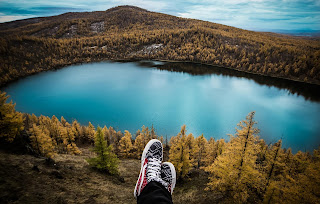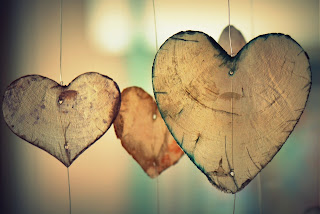Holy Interruption
Luke 24:1-12
Our story begins in the early morning, a couple of days after Jesus' death. A few women were walking to his grave. I always assumed they wanted to check and make sure nothing had been disturbed. Much like we might stop by a cemetery to visit the grave of a recently buried friend. Saying one last goodbye, and tidying the flowers by the headstone.
Except this year, I noticed something. At the end of the passion gospel, Luke writes: “It was the day of Preparation, and the sabbath was dawning. The women who had come with him from Galilee followed, and they saw the tomb and how his body was laid. Then they returned, and prepared spices and ointments. On the sabbath day they rested according to the commandment.”
For the first time, I noticed that Jesus' burial was interrupted by the sabbath. Immediately following Jesus’ death, Joseph of Arimathea got Pilate’s permission to take Jesus’ body down from the cross. He then “...wrapped it in a linen cloth, and laid it in a rock-hewn tomb where no one had ever been laid.”
This was not unlike when a funeral home director retrieves a body. They go about their work with integrity and care for the one who has died. Preparing the body for transport, storing it in the appropriate place at the funeral home, and eventually preparing the body for burial.
I’ll never forget when my grandmother died unexpectedly in an automobile accident. The following day at the funeral home, I asked to see her body. Like the women, looking into the tomb to see how Jesus’ body was laid, I just needed to see that she was gone, and that her earthly body had found peace.
My request flustered the funeral home director. He had not prepared her body for burial, and he was concerned that it would not be good for me to see her. But I knew myself, and her, enough to know that I needed to see her, and so I pushed back, and he acquiesced.
When I stood before her, I was able to see that the grandmother I had loved was no longer in this place and time - she was now at peace with God. So I said my final goodbye, touched her hands, and commended her to God in prayer. We don’t always get this privilege, and I was grateful for this final touchstone.
For most of human history, the last way humans have expressed our care for our loved one was by preparing their body for burial. Washing, anointing, dressing, laying them gently in their final resting place. During our lifetime, this art has been largely forgotten, left for the professionals.
Yet for these women who had traveled with Jesus from Galilee, it would be their last act of love for their teacher and friend. These women looked into the tomb, saw how his body was laid, and then returned to their lodgings to prepare the spices and ointments. As the sabbath dawned, they stopped and rested according to the commandment. This means, they ceased their work. In doing so, they were living into their communal promise to walk with God six days of the week, and stop to rest with God on the seventh day. It was a holy interruption.
Immediately following the sabbath, our story begins. Luke writes, “...at early dawn, they came to the tomb, taking the spices that they had prepared.”
They were ready to complete the ritual of burying Jesus with tender love and care. Except, what they found was, “...the stone rolled away from the tomb.” When they went into the tomb, “...they did not find the body.”
These women were perplexed - what could possibly have happened?Suddenly the women noticed two figures in dazzling clothes. They became terrified, bowing their faces to the ground. The figures asked them,“Why do you look for the living among the dead? He is not here, but has risen.”
These two figures remind the women - this is what Jesus said would happen. “Then they remembered…”
These women, like us, needed to be reminded. To be reminded that on the other side of holy interruption is new life. When the sabbath began to dawn following his death, it was too much to remember. All they knew was they had to prepare the spices and ointments, but they were interrupted from finishing their work of tending Jesus’ body for burial. An interruption that probably felt frustrating beyond measure at the time.
We know something about that. Remember in March of 2020, when we were in the middle of our season of Lent, and a global pandemic interrupted everything? Remember how we thought we were stopping in-person worship for two weeks? How we assured one another we would most certainly be together, singing our favorite hymns that Easter?Remember that interruption? For the last two years, that interruption has felt anything but holy.
But today, that two year interruption without in-person worship during Holy Week and Easter has brought us new life. We are here, together, in person - shouting and singing, Christ is Risen! Alleluia, Alleluia, Alleluia!
For two years, our lives were interrupted in every conceivable and inconceivable way. And all we could do was prepare the spices and ointments, waiting. Being in the moment, trusting that eventually, new life would come. We rested with God.
And finally, at long last, this holy interruption has brought us new life. I’m not sure an Easter morning has ever felt as sweet and ripe as this one. To stand here gathered together as the body of Christ - singing, breaking bread, and sharing the common cup together. Alleluia, alleluia, alleluia!
Like the women, as we leave the empty tomb today, we need to remember. Remember that as the body of Christ, we can be the Church in ways we never dared imagine before the holy interruption of covid-19. Remember the promise that Christ is always with us. Remember the promise that with death, there always comes new life. Remember that love is stronger than death.
This two year long, holy Saturday has been a time of spiritual growth and maturity. It has expanded our understanding of what it means to be a follower of Christ in a world full of aching and loneliness. It has taught us the importance of living in community; something I know so many of us, myself included, had simply taken for granted.
I always thought the reason I came to church was for communion - to receive the bread and wine. Then we spent the first year of the pandemic fasting from communion. And that begged the question - why come to church?
What I learned was that the reason I came to church was for communion. Not the kind we eat and drink, but the communion we create when we come together in our common life and worship as the body of Christ. It is in these communal gatherings of the living, breathing Church that the nourishment of the bread and wine becomes most clearly understood. The bread and the wine are really and truly the sign and symbol of our connection to Christ and one another. Jesus gave us this ritual to remember that in coming together to worship God we receive all that we need to be healthy, grow, and develop as followers of the Way of Love. It is our shared common life and worship which creates and magnifies the experience of nourishment when we receive the bread and wine. Communion is what sustains and empowers us to live into our mutual calling to spread God’s love and transform this world into God’s dream for creation.
May this holy interruption we’ve just lived through remind us that God is always with us, offering us endless second chances, and a new way of life in Christ. Amen.
As preached at Saints James and Andrew, Greenfield, Massachusetts




Comments
Post a Comment